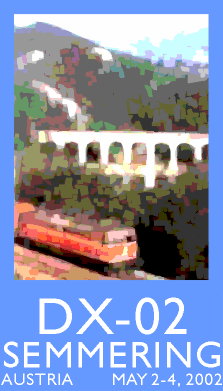
Workshop Program Co-chairs
Markus StumptnerUniversity of South Australia
Advanced Computing Research Center
5095 Mawson Lakes, Adelaide, SA, Australia
mst@cs.unisa.edu.au
Franz Wotawa
Technische Universität
Graz
IICM - Institut for
Software Technology
Inffeldgasse 16b/II, A-8010
Graz, Austria
wotawa@ist.tu-graz.ac.at
Program Committee
Bert Bredeweg (University of Amsterdam, Netherlands)Marie-Odile Cordier (Irisa, France)
Mireille Ducasse (Irisa,France)
Daniele Theseider Dupre' (Univ. Piemonte Orientale, Italy)
Yousri El Fattah (Rockwell, USA)
Jan Lunze (Ruhr-Universität Bochum, Germany)
Pieter J. Mosterman (The MathWorks Inc., USA)
Chris Price (University of Wales, UK)
Bernhard Rinner (TU Graz, Austria)
Meera Sampath (Xerox, USA)
Howard E. Shrobe (MIT, USA)
Peter Struss (Occ'm Software and TU München, Germany)
Patrick Taillibert (Thales, France)
Mugur Tatar (DaimlerChrysler, Germany)
Takashi Washio (Osaka University, Japan)
Marina Zanella (Universita' di Brescia, Italy)
Feng Zhao (Xerox PARC, USA)
Important Dates
Abstract submission: February 1, 2002Paper submission: February 7, 2002
Acceptance notification: March 15, 2002
Camera-ready copy due: April 2, 2002
Workshop: May 2-4, 2002
Preliminary CFP
13th International Workshop on Principles of Diagnosis (DX-02)
2-4 May, 2002
Semmering, Austria
This international
workshop series, originating within the Artificial Intelligence
community, focuses on theories, principles and computational
techniques for diagnosis, testing, reconfiguration and repair of
complex systems. Complex systems can be large hardware systems,
continuous, discrete, or hybrid systems, but also programs and a
combination of all. The workshop also focuses on transfer of these
theories, principles and techniques to industrial applications of
diagnostic problem solving. This lively annual forum fosters
interaction and cooperation among researchers with diverse interests
and approaches to diagnosis in Artificial Intelligence, such as
model-based and qualitative reasoning, as well as in related areas,
such as FDI, control, and software debugging. The workshop has
traditionally adopted a single-track program, and limited the number
of participants to support technical exchange and debate. This year
we are especially interested in demonstrations of diagnosis
applications and prototypes of diagnosis engines together with runtime
performance analysis and comparisons to other implementations.
We solicit papers in a variety of areas related to diagnostic problem solving, including but not limited to:
- Formal theories of and computational methods for diagnosis, monitoring, testing, repair, reconfiguration and related topics.
- Modeling: symbolic, numeric, discrete, continuous, hybrid discrete/continuous, probabilistic, functional, behavioral, and qualitative modeling, as well as abstractions and approximations.
- Computational issues: controlling combinatorial explosion, focusing strategies, limiting computation for complex systems, use of structural knowledge, use of hierarchical knowledge, abstraction and approximation techniques.
- The diagnosis process: repair strategies, sensor placement, test selection, resource-bounded reasoning, real-time diagnosis, on-board autonomous operation, active testing, experiment design, predictive diagnosis, contingency planning.
- Connections between diagnosis and other areas: FDI techniques, control theory, design, machine learning, nonmonotonic reasoning, planning, execution, Bayesian reasoning, Markov modeling, real time languages, software V&V, debugging, synthesis, hardware testing, philosophical issues on diagnosis and modeling.
- Principled applications and technology transfer: real-world applications and integrated systems in a wide range of fields including medical, chemical, mechanical, electrical, electro-mechanical and electronics systems. We especially welcome insights on whether and why a specific technique succeeded (or failed) in a realworld context.
Submission Information
Papers must not exceed 5000 words, including references and abstract. The text should be in 12 point type with a minimum of 1-inch margins on both sides. Final papers must be submitted in IJCAI format. Workshop notes will only be distributed to participants to facilitate resubmission of papers to conferences or journals.Authors must submit their paper's title and abstract via email to dx2002@dbai.tuwien.ac.at by February 1, 2002. A postscript or pdf file of the full paper should then be emailed to dx2002@dbai.tuwien.ac.at by February 7, 2002. Although postscript submissions are preferred, authors may send hardcopies of their papers to Franz Wotawa at the address below; 4 copies of each paper must be received by February 7, 2002.
Please include postal addresses, electronic mail, fax, and telephone numbers on the cover page of all papers. Authors will be notified of acceptance or rejection by March 15, 2002. Accepted papers should be revised to accommodate the referee comments before final submission for inclusion in the workshop working notes. Camera-ready copies of the final paper are due by April 2, 2002.
For those who wish to
attend the Workshop without submitting a paper, please email a short
abstract describing your research interests to dx2002@dbai.tuwien.ac.at by
February 7, 2002. Invitations will be mailed out by March 15, 2002.
To promote active discussion at the workshop, attendance will be by
invitation only.